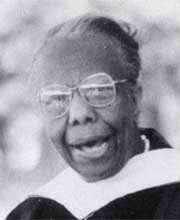 It's a question I get pretty often ... sometimes in comments on this blog (you know who you are), sometimes by email, sometimes by handwritten notes with no return address (the snailmail version of "anonymous comment.")
It's a question I get pretty often ... sometimes in comments on this blog (you know who you are), sometimes by email, sometimes by handwritten notes with no return address (the snailmail version of "anonymous comment.")"But what if you're wrong?"
The best answer I have isn't mine ... it's Verna Dozier's and it comes from "The Dream of God:"
=====
 We want to be safe, to be sure we are doing the right thing. That to me is the voice of the Tempter.
We want to be safe, to be sure we are doing the right thing. That to me is the voice of the Tempter. Kingdom-of-God thinking calls us to risk. We always see through a glass darkly, and that is what faith is about. I will live by the best I can discern today. Tomorrow I may find out I was wrong. Since I do not live by being right, I am not destroyed by being wrong. The God revealed in Jesus whom I call the Christ is a God whose forgiveness goes ahead of me, and whose love sustains me and the whole created world. That God bursts all the definitions of our small minds, all the limitations of our timid efforts, all the boundaries of our institutions.
The urgent task for us is to reclaim our identity as the people of God and live into our high calling as the baptized community. We are a chosen people, chosen for God's high purposes, that the dream of God for a new creation may be realized. God has paid us the high compliment of calling us to be coworkers with our Creator, a compliment so awesome that we have fled from it and taken refuge in the church. God does not need such an institution.
The institution is replaceable. The living body of God's people is not.
"Behold, I make all things new" is the word of the Lord, but the institution damns newness as novelty or trend, and herds the sheep back to the security of the old fold. Jesus said, "You have heard it said of old, but behold, I say unto you ..." Yet the institution claims the Bible says only one thing, and only the church can interpret it.
Faith never says "This is how it was" but "This is how we saw it." Faith always includes the possibility it could at any given moment be wrong, and that is why it requires courage. Faith is taking the risk that what I understand today calls for commitment of heart and mind and soul, even though at all times I know that what I understand today may be revealed to be wanting tomorrow.
=====
That's my answer.
.
That blew me away! I would want to humbly add that the less I assume I'm right, the less I turn out to be wrong. I don't need to live in "right-ness" but rather in righteousness. To me that means to follow Christ's message of loving God and my neighbor. It will certainly mean other things to other people.
ReplyDeleteAdditionally, it allows me to see that others can be wrong without being evil.
Thank you for that amazing quote!
-J
Verna Dozier.
ReplyDelete"The Dream of God."
My nominee for best book in the history of words.
Perfect answer, Susan. I'm going to copy it to my files for future reference (we must have some of th same rude visitors who ask the same questions).
ReplyDeleteElizabeth - does this mean we are rude for simply questioning?
ReplyDeleteWould it be better if people like me, ones who are still questioning, did not frequent this site?
Texas WaterBird
Dear Tex,
ReplyDeleteOf course you are not rude for simply asking the question.
I hope you hang around this site alot. There's so much to be learned from what Susan posts here.
Additionally, it allows me to see that others can be wrong without being evil.
ReplyDeleteI do not at this time have the time to respond in detail to the original post, but I at least want to say that I can wholeheartedly endorse this statement.
I don't think the response is sufficient. It sounds like it is saying "Today, I'm ready for our prophetic action to break the Anglican Communion, but tomorrow I might have a completely different viewpoint." It's too glib; we have to consider that our actions have consequences, and must at least balance these against whether we might be wrong. Courage, yes, but impetuous, no.
ReplyDeleteFurthermore, if one is interested in reconciliation, one must must try to understand the view of the "other." Answering the question at face value (which this response does not do) is a necessary component of the work.
John Boyland
Sorry, John ... I'm convinced that it is being open to being wrong that allows us to move forward in faith ... trusting in the ongoing revelation of the Holy Spirit to inform us and the mercy of the God whose quality is always to have mercy to catch us if we fall.
ReplyDeleteI've never thought of it as being "glib."
As for reconciliation, it seems to me a crucial component in genuine dialogue is allowing "the other" to speak their truth and receive it as such. So I stand by my response ... per Verna:
"I strive to live by the best I can discern today. Tomorrow I may find out I was wrong. Since I do not live by being right, I am not destroyed by being wrong."